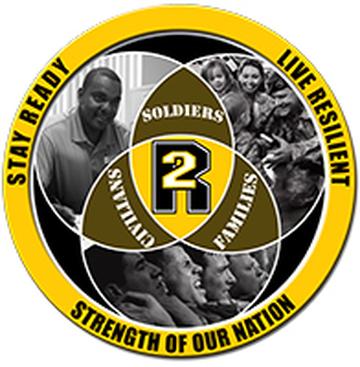Suicide Prevention Month
Every Soldier is a valued member of the Army team as is critical to unit and Army readiness and mission accomplishment. All Soldiers have a duty and obligation to engage at the earliest sign of alerts; Leaders are empowered to know and care for those they lead and are accountable for the Personal Readiness and Resilience of their formations.
In support of Suicide Prevention Month, the Army is collecting stories from members of the Army team -- Soldiers, Army Civilians and Family members... read more
Every Soldier is a valued member of the Army team as is critical to unit and Army readiness and mission accomplishment. All Soldiers have a duty and obligation to engage at the earliest sign of alerts; Leaders are empowered to know and care for those they lead and are accountable for the Personal Readiness and Resilience of their formations.
In support of Suicide Prevention Month, the Army is collecting stories from members of the Army team -- Soldiers, Army Civilians and Family members -- that highlight a time when protective factors and early engagement helped to mitigate risk.
We are asking Soldiers and Family members to tell their stories:
We'd like the stories to be about prevention and early intervention; we’re asking for messaging from the field that emphasizes:
-Building protective factors
-Importance of connections with Leaders, Family and Peers -Intervention at earliest signs of alerts -Remaining vigilant and recognizing warning signs -Resources and information on where to seek help -Stories of hope and recovery.
Protective Factors serve as a buffer and reduce the likelihood and impact of stressors. Examples of protective factors are: self-awareness and self-regulation; unit/team cohesion; Culture of Trust; connections/relationships; coping skills; and knowledge of available resources.
But Army life isn't always easy and stressors can arise. Members of the Army team should be vigilant and take action at the first sign of alerts, which may include: frequent angry outbursts, increased anxiety, reckless or dangerous behavior -- any behavior that deviates from standards.
Suicide is complex. It is important to know when someone is exhibiting warning signs such as talking about suicide, giving away possessions, researching a way to die by suicide, or saying goodbye.
SOLDIERS: Tell us about a time you engaged with a battle buddy, a teammate or a Family member and that engagement potentially changed the trajectory of that person's life in a positive way. Engagement could include: conversations to strengthen the relationship; helping someone access financial support or counseling; reaching out to another person or entity in an effort to get that person help, such as chain of command or a chaplain. Highlight how these engagements helped to build connection and trust, resulting in greater care and support and improved lives.
LEADERS: Tell us about a time you engaged with subordinates, fellow leaders or Family members and that engagement potentially changed the trajectory of that person's life in a positive way. Engagement could include: conversations to strengthen unit cohesion and to better know and understand the lives of those you lead; helping someone access financial support or counseling without stigma; reaching out to another person or entity in an effort to get that person help, such as chain of command, non-federal entity or a chaplain. Highlight how these engagements helped to build connection and trust, resulting in greater care and support and improved lives, and how, as a leader, you were engaged and empowered to sustain the Personal Readiness of your team. show less
















